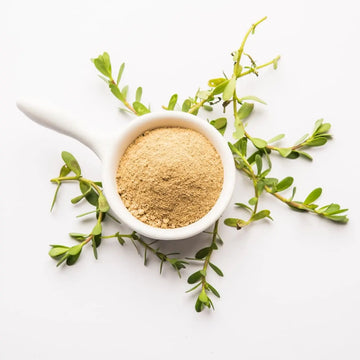Adaptogens: What Are They? How to Choose for Yourself and How to Use Them?
What are adaptogens?
Adaptogens are unique plants that are effective in maintaining the body's homeostasis and building immunity. They are natural stimulants of health and well-being.
Types of adaptogens
Among the most effective adaptogens are the following Indian herbs, each of which additionally has a targeted effect:
- Ashwagandha - supports the body in coping better with stress, adds energy, regulates hormonal balance, supports male fertility.
- Tulsi - has anti-inflammatory, antiviral and supports the immune and respiratory systems. It has a calming effect, taken in the evening it helps to fall asleep.
- Gotu Kola - improves memory, concentration and cognitive abilities.
- Shatavari - supports the hormonal system, especially in women.
- Moringa - a plant with strong antioxidant properties, supporting the immune system and helping to maintain appropriate blood glucose levels.
- Brahmi - improves cognitive functions, memory and ability to concentrate.
The mechanism of action of adaptogens
The mechanism of action of adaptogens is based on their influence on various systems and organs in the body, such as the nervous, hormonal and immune systems. Adaptogens influence the level of stress hormones, such as cortisol, and the secretion of neurotransmitters, such as serotonin and dopamine. As a result, adaptogens help the body cope with stress, improve mood, concentration and overall body performance.
Adaptogens work holistically, meaning they affect various aspects of the body's functioning, not just one specific system or organ, but also support the psyche. When we introduce an adaptogen into our diet, such as ashwagandha or tulsi, we can feel positive changes in the digestion process, bowel movements, etc. (This effect may vary from person to person). This makes adaptogens a comprehensive support for health and well-being.
When is it best to use adaptogens?
Adaptogens are an effective solution for those looking to prevent and treat stress-related disorders. Their use is wide-ranging and includes supporting the treatment of depression, anxiety, chronic fatigue, as well as diabetes and infections. In addition, adaptogens can support skin health, heart health, and regulate hypertension. They are also helpful in combating chronic inflammation and autoimmune diseases, offering natural support in maintaining overall health and balance of the body.
Adaptogens: Who Are They Suitable for and Who Should Avoid Them?
Adaptogens are recommended for people who want to improve their health and immunity, reduce stress, increase physical and mental performance or support the nervous system. They can be used by athletes, people who work mentally, and also by the elderly to improve the overall condition of the body. People with allergies to adaptogen ingredients, pregnant women, breastfeeding women and people taking medications that may interact with adaptogens should consult a doctor before starting supplementation.
How to take adaptogens?
Introducing adaptogens into your daily supplementation can bring many benefits, such as improving cognitive function, supporting the nervous system, and increasing physical and mental performance.

Adaptogens in powder or capsules?
Adaptogens are available in various forms of supplementation, such as tablets or capsules. Choosing the right form depends on individual preferences and supplementation goals. When comparing the two forms, you can see some differences:
- Herbs in powder - the simplest form of herbs with the mildest effect. They can be consumed in combination with honey or ghee (clarified butter), but you can also prepare infusions or teas from them, add them to dishes.
- Capsules - they provide better bioavailability of ingredients, are easy to swallow and can be more easily absorbed by the body.
- Ayurvedic juices - their advantage is that they are prepared from fresh plants and fruits.
What are standardized extracts?
Adaptogens also come in the form of standardized extracts. During the standardization process, not only is the content of active ingredients tested, but also the purity of the raw material is assessed.
In this case, the information on the DER (Drug Extract Ratio) packaging is important for the consumer – an indicator of the amount of plant material to the amount of the obtained plant product (in the form of, for example, a capsule). Its purpose is to enable comparison of products containing the same substance but obtained in different ways (e.g. extracts with different degrees of concentration).
For example, DER 6:1 means that 6 grams of raw material (plant or plant part) yield 1 gram of extract. This is important to understand how concentrated the active ingredients of adaptogens are. More concentrated herbal supplements in the form of a standardized extract will have a stronger effect and a more pronounced and faster effect.
Most Popular Adaptogens: Why Are They Gaining Popularity?
The most effective adaptogens on the market include plants such as ashwagandha, gotu kola, moringa, and tulsi. They are gaining popularity due to their wide range of health-promoting properties, such as reducing stress, improving concentration, increasing physical performance, and supporting the immune system. In addition, adaptogens are increasingly used as an alternative to synthetic drugs and supplements, which contributes to their growing popularity.
Safety of using adaptogens
Although adaptogens are natural supplements, there are some contraindications and side effects that are worth knowing before starting supplementation.
Ashwagandha Adaptogens: Benefits and Potential Risks
Ashwagandha adaptogens are among the most popular on the market. Ashwagandha has many health benefits, such as reducing stress, improving concentration, increasing physical performance and supporting the immune system. It may affect the action of some medications, such as antidiabetics, antihypertensives or anticoagulants. Before starting supplementation, it is worth consulting a doctor if you are taking other medications.



